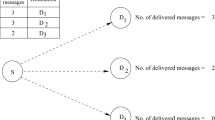Abstract
Delay tolerant networks (DTNs) are a kind of sparse and highly mobile wireless networks, where no stable connectivity guarantee can be assumed. Most DTN users have several points of interest (PoIs), and they enjoy disseminating messages to the other users of the same PoI through WiFi. In DTNs, some time-sensitive messages (disaster warnings, search notices, etc.) need to be rapidly propagated among specific users or areas. Therefore, finding a path from the source to the destination with the shortest delay is the key problem. Taking the dissemination cost into consideration, we propose an efficient message dissemination strategy for minimizing delivery delay (MDMD) in DTNs, which first defines the user’s activeness according to the transiting habit among different PoIs. Furthermore, depending on the activeness, an optimal user in each PoI is selected to constitute the path with the shortest delay. Finally, the MDMD with inactive state (on the way between PoIs) is further proposed to enhance the applicability. Simulation results show that, compared with other dissemination strategies, MDMD achieves the lowest average delay, and the comparable average hopcounts, on the premise that the delivery ratio is guaranteed to be 100% by the sufficient simulation time.
Similar content being viewed by others
Explore related subjects
Discover the latest articles, news and stories from top researchers in related subjects.References
Burleigh S, Hooke A, Torgerson L. Delay-tolerant networking: An approach to interplanetary Internet. IEEE Communications Magazine, 2003, 41(6): 128-136.
Wang E, Yang Y, Wu J. A Knapsack-based buffer management strategy for delay-tolerant networks. Journal of Parallel and Distributed Computing, 2015, 86(C): 1-15.
Akyildiz I F, Akan Ö, Chen C, Fang J, Su W. InterPlaNetary Internet: State-of-the-art and research challenges. Computer Networks, 2003, 43(2): 75-112.
Uddin M Y S, Ahmadi H, Abdelzaher T, Kravets R. Intercontact routing for energy constrained disaster response networks. IEEE Transactions on Mobile Computing, 2013, 12(10): 1986-1998.
Juang P, Oki H, Wang Y, Martonosi M, Peh L S, Rubenstein D. Energy-efficient computing for wildlife tracking: Design tradeoffs and early experiences with ZebraNet. In Proc. the 10th ASPLOS., Oct. 2002, pp.96-107.
Yang S, Yeo C K, Lee F B S. Cooperative duty cycling for energy-efficient contact discovery in pocket switched networks. IEEE Transactions on Vehicular Technology, 2013, 62(4): 1815-1826.
Wu J, Wang Y. Hypercube-based multipath social feature routing in human contact networks. IEEE Transactions on Computers, 2014, 63(2): 383-396.
Xiao M, Wu J, Huang L. Community-aware opportunistic routing in mobile social networks. IEEE Transactions on Computers, 2014, 63(7): 1682-1695.
Zhang X, Neglia G, Kurose J, Towsley D F. Performance modeling of epidemic routing. Computer Networks, 2007, 51(10): 2867-2891.
Erramilli V, Crovella M, Chaintreau A, Diot C. Delegation forwarding. In Proc. the 9th ACM MobiHoc, May 2008, pp.251-260.
Dubois-Ferriere H, Grossglauser M, Vetterli M. Age matters: Efficient route discovery in mobile ad hoc networks using encounter ages. In Proc. ACM MobiHoc 2003, June 2003, pp.257-266.
Wei K, Guo S, Zeng D, Xu K, Li K. Exploiting small world properties for message forwarding in delay tolerant networks. IEEE Transactions on Computers, 2015, 64(10): 2809-2818.
Lu Y, Wang W, Chen L, Zhang Z, Huang A. Distance-based energy-efficient opportunistic broadcast forwarding in mobile delay-tolerant networks. IEEE Transactions on Vehicular Technology, 2016, 65(7): 5512-5524.
Elwhishi A, Ho P H, Naik K, Shihada B. A novel message scheduling framework for delay tolerant networks routing. IEEE Transactions on Parallel and Distributed Systems, 2013, 24(5): 871-880.
Krifa A, Barakat C, Spyropoulos T. Message drop and scheduling in DTNs: Theory and practice. IEEE Transactions on Mobile Computing, 2012, 11(9): 1470-1483.
Wang E, Yang Y, Wu J, Liu W. A buffer management strategy on spray and wait routing protocol in DTNs. In Proc. the 44th IEEE ICPP, Sept. 2015, pp.799-808.
Huang J, Liu W, Su Y, Wang F. Multi-rate combination of partial information-based routing and adaptive modulation and coding for space deterministic delay/disruption tolerant networks. IET Communications, 2017, 11(9): 1365-1370.
Seregina T, Brun O, El-Azouzi R, Prabhu B J. On the design of a reward-based incentive mechanism for delay tolerant networks. IEEE Transactions on Mobile Computing, 2017, 16(2): 453-465.
Wang R, Qiu M, Zhao K, Qian Y. Optimal RTO timer for best transmission efficiency of DTN protocol in deep-space vehicle communications. IEEE Transactions on Vehicular Technology, 2017, 66(3): 2536-2550.
Li F, Jiang H, Li H, Cheng Y, Wang Y. SEBAR: Social-energy-based routing for mobile social delay-tolerant networks. IEEE Transactions on Vehicular Technology, 2017, 66(8): 7195-7206.
Sabbagh A, Wang R, Zhao K, Bian D. Bundle protocol over highly asymmetric deep-space channels. IEEE Transactions on Wireless Communications, 2017, 16(4): 2478-2489.
Sakai K, Sun M T, Ku W S, Wu J, Alanazi F S. Performance and security analyses of onion-based anonymous routing for delay tolerant networks. IEEE Transactions on Mobile Computing, 2017, 16(12): 3473-3487.
Lindgren A, Doria A, Schelén O. Probabilistic routing in intermittently connected networks. ACM SIGMOBILE Mobile Computing and Communications Review, 2003, 7(3): 19-20.
Zhang X, Kurose J, Levine B N, Towsley D, Zhang H. Study of a bus-based disruption-tolerant network: Mobility modeling and impact on routing. In Proc. the 13th MobiCom, Sept. 2007, pp.195-206.
Spyropoulos T, Psounis K, Raghavendra C S. Efficient routing in intermittently connected mobile networks: The multiple-copy case. IEEE/ACM Transactions on Networking, 2008, 16(1): 77-90.
Wang E, Yang Y, Wu J, Yang W S, Liu W B. A lightweight message dissemination strategy for minimizing delay in online social networks. In Proc. Globecom, Dec. 2015, pp.1-6.
Author information
Authors and Affiliations
Corresponding author
Electronic supplementary material
ESM 1
(PDF 232 kb)
Rights and permissions
About this article
Cite this article
Wang, E., Yang, WS., Yang, YJ. et al. An Efficient Message Dissemination Scheme for Minimizing Delivery Delay in Delay Tolerant Networks. J. Comput. Sci. Technol. 33, 1101–1124 (2018). https://doi.org/10.1007/s11390-018-1875-7
Received:
Revised:
Published:
Issue Date:
DOI: https://doi.org/10.1007/s11390-018-1875-7




